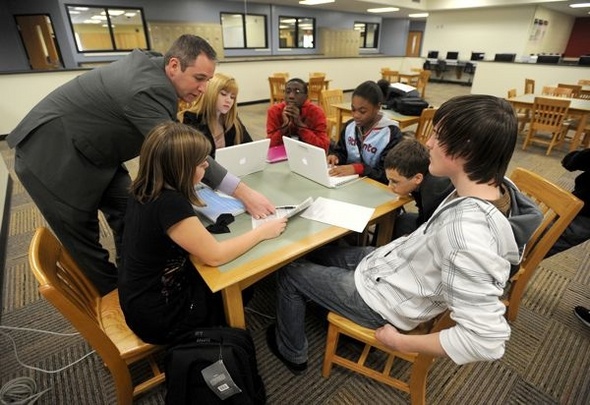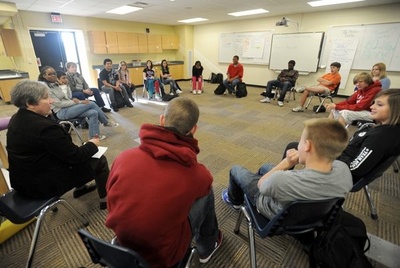Ypsilanti New Tech High School's unconventional approach resonating with teachers, students

Clockwise from left: New Tech High School Director Cory McElmeel talks with Student Voice members Abbey Johnson, Tionte Curtis, Jazmen McDonald, Timothy Suckow, Nick Helsel and Naomi Cotner about creating punch cards for school rule violations. Members of the Student Voice are elected representatives from each student advisory group and address building-wide issues and student concerns.
Angela Cesere | AnnArbor.com
Note: This story has been corrected to give the correct spelling of a teacher's name
Ypsilanti New Tech High School at Ardis isn't your typical school.
Three subjects — Geoart, Historytech and Biolit — are taught in wide open classrooms with six teachers and 100-plus students, using a still developing way of teaching and learning.
The school relies on project-based learning to assist students, not exactly the normal one-way teaching used in traditional schools.
“We’re not telling them what they need to do,” said Director Cory McElmeel. “We want them to discover what they have to do.”
New Tech High School opened at the start of the school year in the former Ardis Elementary School, which had been closed for five years. The high school follows a national model of project-based learning with an emphasis on technology.
New Tech is one of five similar schools that opened in Michigan this year, with more than 50 in operation around the country.
Each class is a hybrid of two traditional subjects and is taught by two teachers. The new dynamic took some getting used to, said Historytech teacher Mark Salzer.
“There’s been more buy in, more awareness of how to navigate this type of environment,” Salzer said. “Over these last bit of projects, there’s a realization that there’s a method to this previously-thought-of madness, an awareness that I need to ask more deep questions, figure out what my next steps are.”
Biolit teacher Carli Pacheco described designing the curriculum and its subsequent implementation as “the most challenging job I’ve ever had.”
It was difficult getting students to realize the training they received on various programs during the first month of school was of dire importance, she said. But now, Pacheco is seeing definite gains and growth.
“Especially now that we’ve had the first card marking, some students are lower than what they’re used to, and now I’m seeing them step up in how hard they’re working,” she said. “They know they can do better and they haven’t been because they were adjusting.”
In addition to the usual grades on content, the teachers at New Tech also grade students on their creativity and work ethic during projects. Pacheco said it helps offset the distractions caused by students having laptops during school hours because they realize their grades depend on being focused.
Several students cited the group dynamic of each project as an exciting aspect of the school.
Freshman Zack Roberson said students are given responsibilities in each group that become vital to the project. That, combined with the individual control students are given over the direction of their project, has become a major motivation.
“It’s easier to wake up and go to school in the morning,” he said. “You know people are depending on you, and you have to be there to chip in.”

New Tech High School teacher Sue Bloom, far left, meets with her student advisory group once a day to talk about current school happenings.
Angela Cesere | AnnArbor.com
While it’s been an adjustment coming to a new school with new freedoms and a new style of learning, freshman Kelsey Scott said her time at New Tech has reinvigorated her attitude about school.
“Knowing people are depending on me and having the responsibility of a laptop and all this technology is exciting,” she said.
The responsibility given to students is similar to what they will experience when they enter the workplace, said Susan Bloom, New Tech’s academic coach.
She said students have been absent from school on days when a group needed them, and instead of simply moving on without them, Bloom asked the students what they would do if it were a job.
“They called their partners and kids would come in and get out of bed and come to school because they said, ‘We need you for this,’” she said. “Kids have the responsibility, and students who would have stayed home would be forced to come to school because not only would they miss something but because they think, ‘My team members need me.’”
There is a waiting list to join the school, and a group of students often lead prospective students and their families on tours of the school.
Emily Waters, a Grass Lake High School freshman, and her mother Kathy toured the school Nov. 12 and walked away impressed. Emily said if a spot came open in January for the second semester of the year, she would take it.
“I really like the small school atmosphere,” she said. “It seems really nice.”
Emily said one of the things that appealed to her was the amount of freedoms students have at the school.
Students are allowed to listen to music, talk on their cell phones during appropriate times when they aren’t being directly instructed and work in the school’s common area during individual and group work times.
McElmeel said the privileges are meant to help students adjust to the relative freedom of college life and professional life. He said there are constraints, and if students abuse the freedoms, they’ll be taken away.
“It’s a delicate dance to give students those freedoms and have that back and forth,” he said, adding the students have done an excellent job so far. “They can go to college and know they’ll be able to handle it.”
Kyle Feldscher covers K-12 education for AnnArbor.com. He can be reached at kylefeldscher@annarbor.com.


Comments
Meaghan
Mon, Dec 20, 2010 : 4 p.m.
Thank you for this story. I had no idea there was a functioning school in the place of the old elementary school. It's also so nice to read a positive story about the Ypsi school system.
Patti Smith
Tue, Nov 30, 2010 : 9:17 a.m.
Yay! It is awesome to read about a true PUBLIC (i.e. as opposed to a for-profit charter school off cherry picking its students and giving teachers scripts to read...oops, did I display a bias there? :)) school doing something so innovative! Since I'm a special ed teacher, I often "push in" to classes with my special ed students. It is almost always better to have two teachers in a room, thus creating a "smaller" atmosphere for the students. The 100-student, 6 teacher model sounds interesting...would love to hear how it turns out!